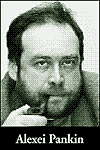 Last
week, NTV anchor Leonid Parfyonov was fired for going public with an internal
memo ordering him not to air an interview with the widow of slain Chechen
separatist leader Zelimkhan Yandarbiyev -- an order that Parfyonov said
amounted to censorship. The general outpouring of sympathy for Parfyonov
impels me to do a little whistle-blowing of my own. Last
week, NTV anchor Leonid Parfyonov was fired for going public with an internal
memo ordering him not to air an interview with the widow of slain Chechen
separatist leader Zelimkhan Yandarbiyev -- an order that Parfyonov said
amounted to censorship. The general outpouring of sympathy for Parfyonov
impels me to do a little whistle-blowing of my own.
In May and June 1996, I served as coordinator of a program devoted
to monitoring press coverage of the presidential election. The program,
funded by the European Commission, operated out of the European Institute
for the Media in Dusseldorf. We began our work a month before election
day. After the first week of monitoring, our observers released a report
demonstrating that all of the major television stations, both state-owned
and independent, were actively promoting the incumbent Boris Yeltsin and
giving short shrift to his rivals, including Yabloko leader Grigory
Yavlinsky.
Shortly thereafter, I got a call from the EC's external relations
department. I was told that by distributing the report under the aegis
of
the European Union I had created the impression that the EU was meddling
in
Russia's internal affairs.
Issuing weekly bulletins and use of the EU logo were spelled out in
our contract, but erring on the side of caution, I suggested that we could
drop the logo. Not enough. I was told to instruct my team not to distribute
any information or talk to the press until after the election.
Had I heard right? Was I being instructed to follow verbal orders
rather than honor a signed contract? Yes, came the reply. I had heard
right.
I have recounted this episode in a few short paragraphs, but at the
time it involved several days on the phone with Brussels trying to hammer
out a compromise between my desire to fulfill our contract to the letter
and
the EU's desire not to compromise Yeltsin's image as a democratic leader.
Our first press release had caught the attention of the world press,
however, and the observers looked rather foolish as they avoided the press
for the duration of the campaign.
Where's the scandal in all this?
You have no doubt noticed how often foreign and domestic journalists,
politicians and think tanks refer to the critical assessments made by
international observers during the parliamentary elections last December
and
the presidential campaign earlier this year. On NTV's talk show "K
Baryeru!"
last week, independent State Duma deputy Vladimir Ryzhkov angrily confronted
his debating opponent, Central Elections Commission chief Alexander
Veshnyakov, with observers' reports of biased television coverage favoring
the party of power.
Every time Europeans arrive to monitor press coverage of elections
in
Russia -- a practice that began in December 1993 -- they reach the same
conclusion. In 1993, the then-EU ambassador protested the findings of
the
EIM monitors by walking out of the news conference at which the team
released its findings. The Russian media entirely ignored this scandalous
behavior. Our EIM team included the phrase "free but not fair"
in its report
on the 1996 election on the insistence of team member and Guardian
journalist Jonathan Steele. At the time, only the newspaper Moskovskiye
Novosti picked up on the report, so it's not surprising that even the
highly
competent Ryzhkov thinks that it was coined for the 2003-04 election cycle.
Even without the reports filed by expensive foreign observers, it is
obvious that getting Yeltsin re-elected with a 3 percent popularity rating
required far more dirty tricks than installing Putin, who enjoys a stable
70
percent popularity rating, in the Kremlin for a second term. And the fact
that observers and "democrats" let the major violations slide
while harping
on for months about trifles only confirms the average Russian's delusion
that foreigners find everything about Russia interesting apart from
democracy.
See also:
the original at
www.themoscowtimes.com
Freedom of Speech
and Media Law in Russia
Presidential elections
1996
|